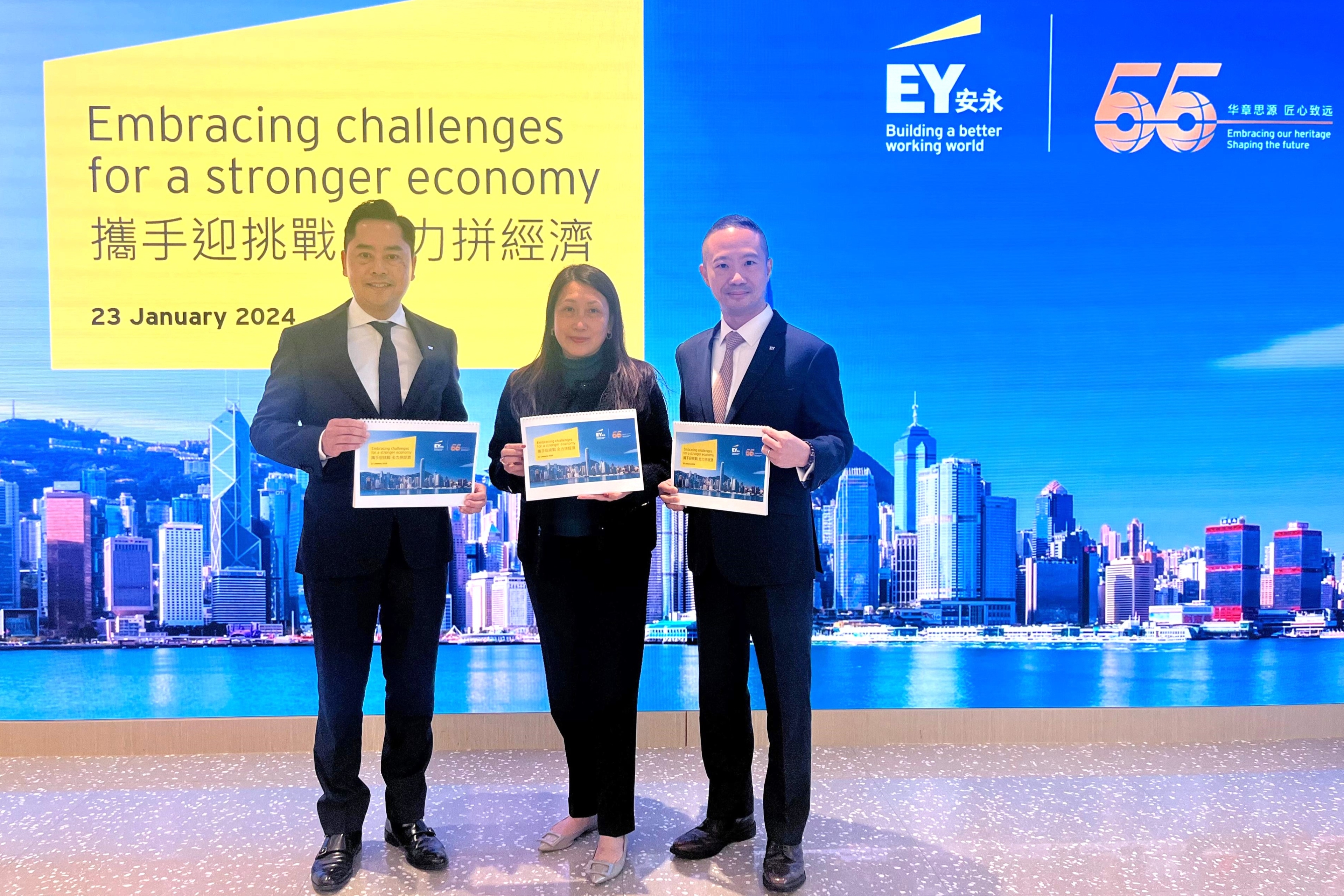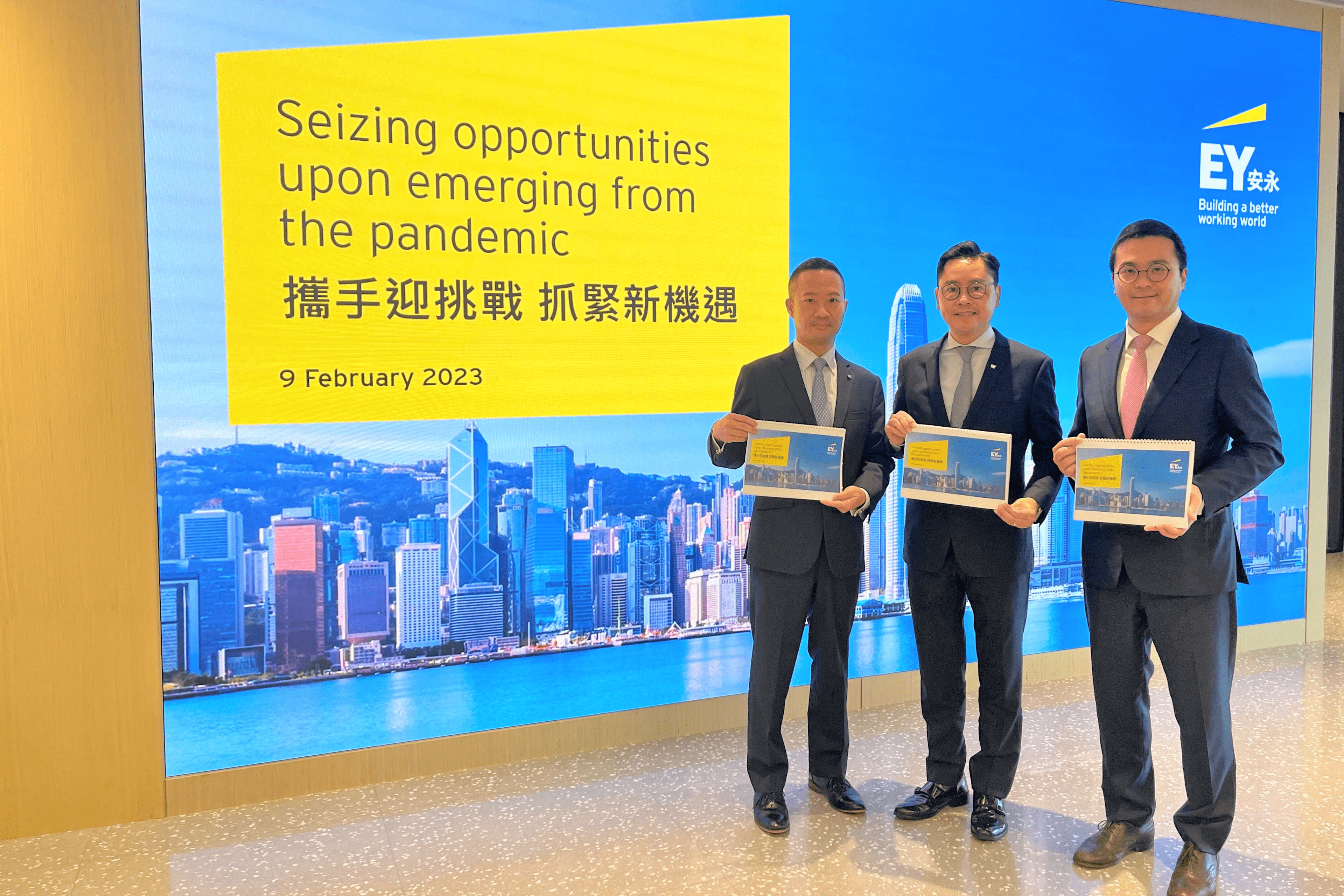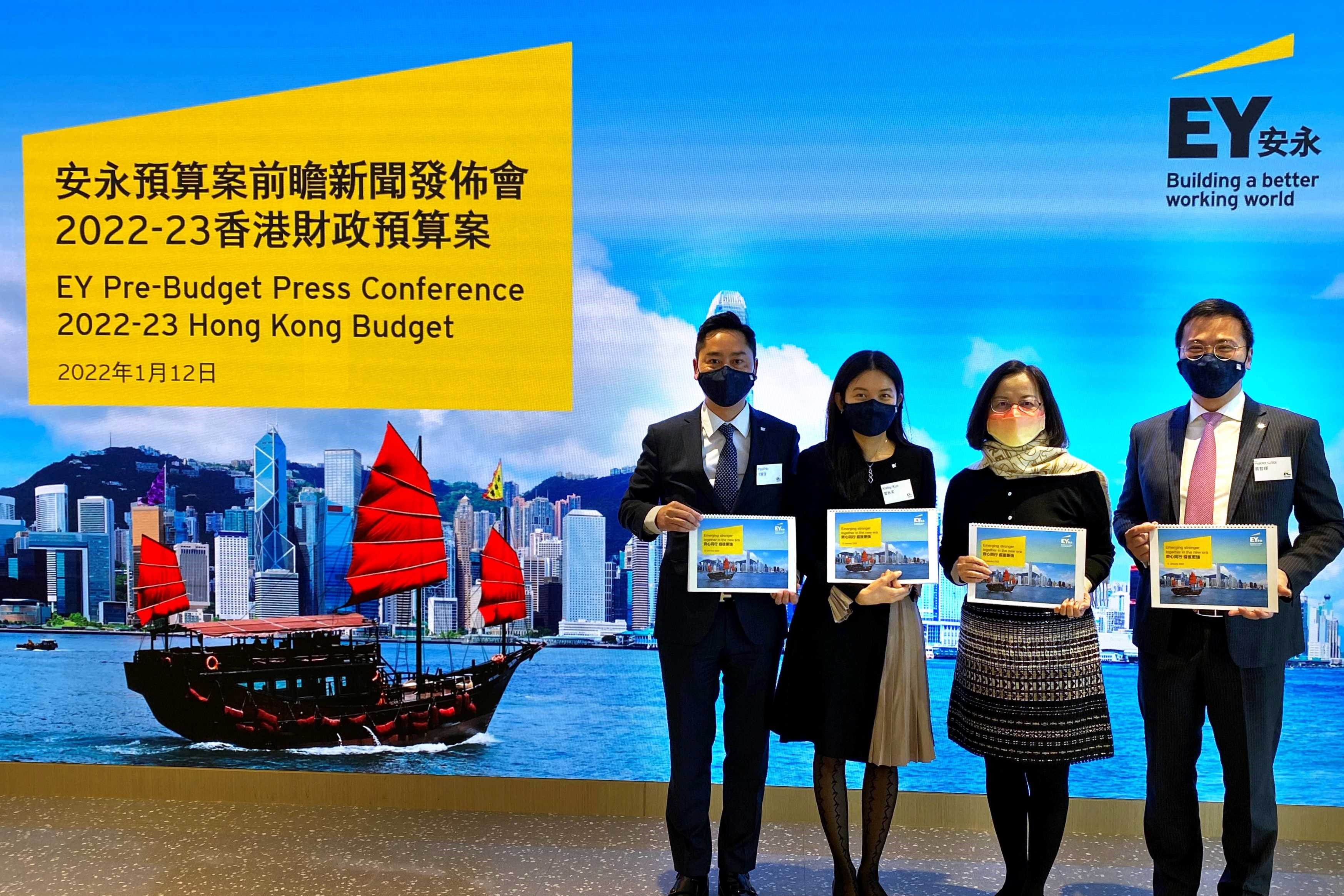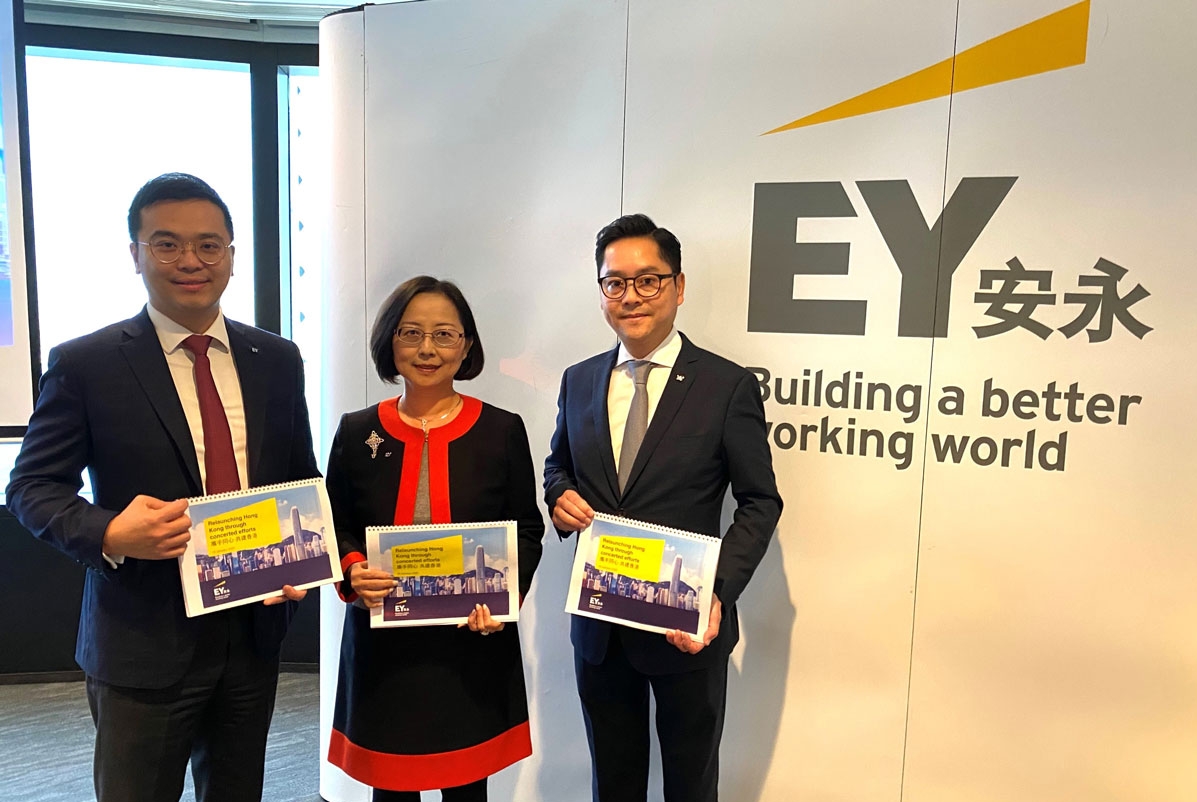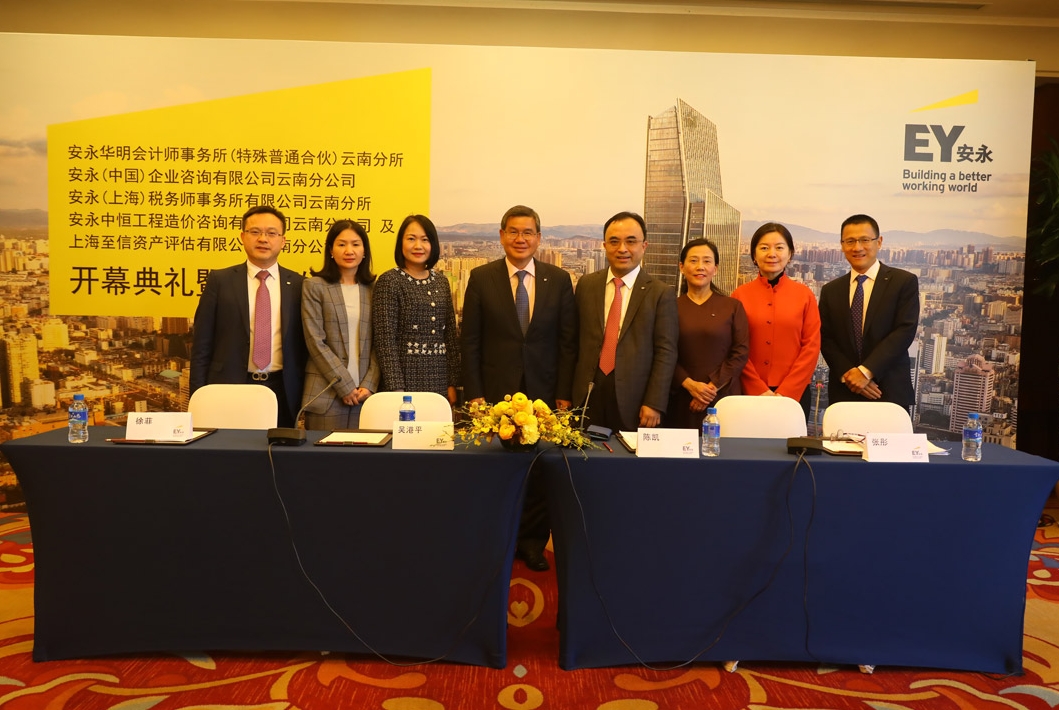EY refers to the global organization, and may refer to one or more, of the member firms of Ernst & Young Global Limited, each of which is a separate legal entity. Ernst & Young Global Limited, a UK company limited by guarantee, does not provide services to clients.
EY estimates a fiscal deficit of HK$18 billion for 2021-22, 80% less than Government’s original estimate
Ernst & Young Tax Services Limited (EY) estimates that the HKSAR Government (the Government) will record a fiscal deficit in the financial year 2021-22 of HK$18 billion, which will be considerably lower than that originally forecasted in the Government’s budget announced in February 2021.
Paul Ho, Financial Services Tax Leader for Hong Kong, Ernst & Young Tax Services Limited, says: “The global economy continues its uneven recovery amid lingering pandemic‑related disruptions. Riding on the rebound of global economic activities and stable local pandemic situation, Hong Kong’s economy expanded significantly in 2021. The revival in consumer and business confidence has boosted the Government’s receipt related to major revenue items.
“Land premiums are expected to exceed the original estimate by HK$25 billion as a number of land lots were sold at near the high-end estimates, including the Central Harbourfront, which was tendered at a record value of HK$50.8 billion. Revenue from stamp duties on property and stock are also expected to be HK$18 billion higher than the original estimate, due to the flourishing market performance.
“Meanwhile, tax revenue is estimated to be HK$19 billion higher than the original estimate. This is mainly because some tax revenue that should be received in the previous year could only be collected this year due to the deferred tax assessment cycle.”
Ho adds: “On the expenditure side, by reference to past trends and based on government’s expenditure incurred in the first eight months of the year, we estimate that actual government expenditure for the year 2021-22 will be HK$21.6 billion less than budgeted.
“All in all, we forecast a deficit of HK$18 billion for 2021-22. This level of budget deficit will reduce Hong Kong’s fiscal reserves to HK$910 billion as at 31 March 2022, amounting to 32% of Hong Kong’s estimated GDP in 2021.”
Further support needed as recovery in global economy is highly uncertain
While Hong Kong’s economy recovered visibly in 2021, the increasing threats of monetary tapering triggered by rising concerns over inflation and the growing concern over the possible impact of the newly‑identified Omicron variant may cloud over global economic growth in 2022. In these circumstances, one-off relief measures are therefore warranted to support the people and businesses of Hong Kong.
Ho says: “We are aware that the series of counter-cyclical measures introduced in the past few years have significantly reduced the Government’s fiscal reserves. But given that this year’s fiscal position is better than expected and recovery in global economy is highly uncertain, we suggest introducing a one-off relief package totaling HK$50 billion to support Hong Kong people and businesses.
“As observed from the market situation, the Consumption Voucher Scheme proposed by EY last year has produced a stimulating effect on the local consumption market and has helped revive the local economy and encourage the wider use of electronic payment among merchants and members of the public. We therefore, propose the Government distribute HK$3,000 e-consumption vouchers to all Hong Kong residents over the age of 18.”
Enhancing tax deductions for charitable donations to cultivate a culture of philanthropy
In recent years, the Central People’s Government has attached great importance to “common prosperity”, particularly the “third distribution of wealth” – individual giving and corporate philanthropy.
“While the current tax regime in Hong Kong allows tax deduction of charitable donations, the limitations imposed on the tax deductions may not be conducive to promoting ‘common prosperity’ in Hong Kong. As such, we propose the following amendments to encourage charitable donations by both individuals and businesses: (i) remove the existing cap of allowing charitable donation up to 35% of the assessable income or profits of individual and business donors; and instead, allow a super tax deduction of 150% for approved charitable donations (cap to an amount to be decided); and (ii) expand approved charitable donations to include in-kind donations of land or buildings and artefacts to qualifying institutions. We believe that the proposed expansion to cover artefact donations would also help to facilitate Hong Kong developing as a hub for arts and cultural exchanges between China and the rest of the world under the 14th Five-Year Plan,” Ho says.
Leveraging the Central Government’s support to reinforce and enhance Hong Kong’s competitive advantages in designated sectors under the 14th Five-Year Plan
The pandemic has set off new domains for competition and cooperation. The 14th Five-Year Plan for National Economic and Social Development of the People’s Republic of China and the Long-Range Objectives Through the Year 2035 (14th Five-Year Plan), which sets out the roles and positioning of Hong Kong in the overall development of the country, will bring vitality and advantageous opportunities to Hong Kong.
To assist businesses and people to seize these opportunities and to enable Hong Kong to integrate into the country's overall development, the Government must empower its people and businesses and find new ways to emerge stronger together in this new era. The EY budget proposals are formulated with a view to attaining these objectives. More details are given in the Appendix.
Promoting green economy and securing a sustainable home for people of Hong Kong
Kathy Kun, Business Tax Services Director, Ernst & Young Tax Services Limited, says: “We welcome the Government’s multi-pronged strategy to promote green and sustainable finance in Hong Kong. To complement these strategies and further develop Hong Kong as a regional green finance hub, we propose offering tax incentives to qualifying green bonds (QGBs) to attract more investors to invest in QGBs traded in Hong Kong.”
“According to the 2019 Hong Kong Emission Inventory Report published by the Environmental Protection Department in August 2021, owing to the significant reduction in emissions from the electricity and road transport sectors over the past years, marine emissions have now become the major emission source in Hong Kong1. To encourage more vessels towards prioritizing sustainability and developing Hong Kong as an international and green maritime center, we propose that ships registered in Hong Kong that have found innovative ways to reduce their carbon emissions will be designated as ‘green ships’ and qualify for lower tonnage and registration fees. In addition, all accredited ‘green ships’ will have their details published on Hong Kong Maritime and Port Board’s website at no extra cost, which should boost their commercial attractiveness,” Kun adds.
Supporting the employment of “silver hair” and enhancing tax deductions for self-education expenses
Robin Choi, People Advisory Services Partner, Ernst & Young Tax Services Limited, says, “Secretary for Labour and Welfare Law Chi-kwong indicated earlier that Hong Kong needs to prepare for an ‘aging tsunami’ in the coming decades. With the challenges of an ageing society impending, promoting the employment of mature persons is one of the possible ways to help unleash potential labor supply, thereby relieve the threat of a shrinking labor force amid an ageing population.
We propose the Government introduce measures to help older workers to earn more, save more, so they may enjoy greater peace of mind during their retirement years. The EY proposals include: (i) allowing a higher amount of basic allowance to individuals aged 60 or above for salaries tax and personal assessment purposes; and (ii) granting employers a non-taxable cash subsidy in a range from 2%-5% of the wages paid to employees aged 60 and above and earning up to HK$20,000 per month (subsidy percentage increases with age).”
“Technology has changed the way we learn and has made virtual learning more common and effective. To fully embrace the opportunities in a post-pandemic world, the Government should align its fiscal policy and financial incentives with global trends. We therefore propose expanding the list of ‘specified education providers’ to include well-established virtual learning platforms that are not currently considered accredited education providers for tax deduction on self-education expenses.
In addition, to enable taxpayers to attain an optimal tax position, we propose allowing taxpayers to defer the claim for deduction of self-education expenses for up to three years from the year of assessment in which they paid the course,” Choi adds.
Appendix to this press release includes a full list of EY’s 2022-23 Budget proposals. We believe that these proposed fiscal measures will help reinforcing and enhancing Hong Kong’s competitive advantages, strengthening our social compact and helping the people and businesses of Hong Kong to emerge stronger together in the new era.
1 https: //www.epd.gov.hk/epd/sites/default/files/epd/data/2019%20Emission%20Inventory%20Report_Eng.pdf
Appendix - Full List of Proposed Budget Measures
Table A – Proposed one-off resilience package for people
Estimated cost HK$ billion | ||
1 | Distribute HK$3,000 e-consumption vouchers to all Hong Kong residents over the age of 18 | 21.0 |
2 | Reduce salaries tax and tax under personal assessment for 2021-22 by 100%, capped at HK$10,000 | 11.5 |
3 | Waive rates for domestic properties for 2022-23, capped at HK$1,000 per quarter for each rateable property | 8.0 |
4 | Provide an extra half month of various social security payments | 2.5 |
Total | 43.0 |
Table B – Proposed one-off resilience package for businesses
Estimated cost HK$ billion | ||
1 | Reduce profits tax for 2021-22 by 100%, capped at HK$10,000 | 1.0 |
2 | Waive rates for non-domestic properties for 2022-23, subject to a ceiling of HK$2,000 per quarter for each rateable property | 1.5 |
3 | Waive business registration fees for 2022-23 | 3.0 |
4 | Further extend the existing waivers or concessions of government fees and charges | 1.5 |
Total | 7.0 |
Table C – Proposed fiscal measures
Estimated cost HK$ billion | ||
1 | Allow home office expenses | 2.0 |
2 | Enhance the dependent parent/grandparent allowance | 4.5 |
3 | Introduce caregiver allowance | 0.5 |
Total | 7.0 |
Table D – Proposed fiscal measures (measures not quantifiable)
Enhancing tax deductions for charitable donations to cultivate a culture of philanthropy | |
1 | Remove the existing cap of allowing charitable donation up to 35% of the assessable income or profits of individual and business donors; and instead, allow a super tax deduction of 150% for approved charitable donations (cap to an amount to be decided); and expand approved charitable donations to include in-kind donations of land or buildings and artefact to qualifying institutions |
Developing Hong Kong into an international innovation and technology center | |
2 | Designate San Tin Technopole as a preferential tax zone |
3 | Offer a profits tax concession to high-new technology and creative start-ups |
4 | Introduce tax relief for angel investors |
5 | Grant super tax deduction for employee training costs paid to accredited providers of training services |
Developing Hong Kong into a regional intellectual property (IP) trading hub | |
6 | Further expand the list of deductible IP |
7 | Allow unilateral tax credits for overseas withholding taxes on royalty fee income |
8 | Introduce a patent box regime |
Further strengthening Hong Kong as an international financial center | |
9 | Exempt property tax for Hong Kong REITs on rental income and grant stamp duty exemption from trading of Hong Kong REIT units |
10 | Enhance tax incentives for bonds funds to set up in Hong Kong |
11 | Offer concessionary tax rate of 8.25% to approved fund managers |
Taking forward the development of the Greater Bay Area (GBA) to support Hong Kong to better integrate into the national development | |
12 | Enhance the current R&D enhanced tax deduction regime to deepen cooperation amongst GBA cities |
13 | Propose to the relevant tax authorities in mainland China to exempt Hong Kong resident enterprises from withholding tax in respect of dividends distributed from their subsidiaries in GBA |
14 | Introduce regional headquarters incentives |
15 | Direct more resources toward the negotiation of Comprehensive Double Taxation Agreements / Arrangements with other jurisdictions |
Promoting green economy and securing a sustainable home for people of Hong Kong | |
15 | Grant super-deduction of 200% in respect of issuance costs of qualifying green bonds and annual compliance expenditure |
16 | Expand the list of qualifying debt instruments to include all qualifying green bonds |
17 | Levy a lower tonnage and registration fees for accredited “green ships” |
18 | Allow a 200% tax deduction for the acquisition cost of plant and machinery employed in recycling businesses in the year of purchase |
19 | Offer concessionary tax rate of 8.25% on qualifying recycling profits |
20 | Waive the first-time registration tax on electric vehicles (EVs) |
21 | Raise the duty on motor-use leaded petrol |
22 | Grant preferential treatment for EVs |
23 | Provide rates concession to incentivize private resident and commercial buildings to install EV charging facilities |
Supporting the employment of “silver hair” | |
24 | Allowing a higher amount of basic allowance to individuals aged 60 or above for salaries tax and personal assessment purposes |
25 | Granting employers a non-taxable cash subsidy in a range from 2%-5% of the wages paid to employees aged 60 and above and earning up to HK$20,000 per month (subsidy percentage increases with age) |
Enhance tax deductions for self-education expenses | |
26 | Expand the list of specified education service providers to include well-established virtual learning platforms |
27 | Allow deferral of self-education expenses claims |
-Ends-
Notes to Editors
About EY
EY exists to build a better working world, helping to create long-term value for clients, people and society and build trust in the capital markets.
Enabled by data and technology, diverse EY teams in over 150 countries provide trust through assurance and help clients grow, transform and operate.
Working across assurance, consulting, law, strategy, tax and transactions, EY teams ask better questions to find new answers for the complex issues facing our world today.
EY refers to the global organization, and may refer to one or more, of the member firms of Ernst & Young Global Limited, each of which is a separate legal entity. Ernst & Young Global Limited, a UK company limited by guarantee, does not provide services to clients, nor does it own or control any member firm or act as the headquarters of any member firm. Information about how EY collects and uses personal data and a description of the rights individuals have under data protection legislation are available via ey.com/privacy. EY member firms do not practice law where prohibited by local laws. For more information about our organization, please visit ey.com.
This news release is issued by the EY China practice, a part of the EY global network.
Related news
HONG KONG, 23 APRIL 2024 — EY supports Invest Hong Kong (InvestHK), a department of the Government of the Hong Kong Special Administrative Region (“HKSAR government”) to prepare the Setting up a family office in Hong Kong guidebook (the “Guidebook”) and offers professional consulting services. This Guidebook has been curated to provide insight into the opportunities available for family offices in Hong Kong and its supportive ecosystem.
HONG KONG, 12 MARCH 2024 — Hong Kong University of Science and Technology (HKUST) Roger King Center for Asian Family Business and Family Office ("the Center") and EY Family Enterprise team (“EY”) today announced the publication of the Landscape of Family Offices in Greater China Report 2024 (the "Report"). Combining academic research and industry expertise, the report provides a comprehensive and insightful analysis of the family office landscape in Greater China. Findings in the report suggest that Chinese mainland families are the primary driving force behind the development of family offices in Hong Kong and that attracting Chinese mainland families is to be focalized.
HONG KONG, 28 FEBRUARY 2024 — The Hong Kong SAR Government (the Government) announced the Hong Kong Budget 2024-25 (the budget) today, in which a revised deficit of HK$101.6 billion will be recorded for the financial year 2023-24, which is almost double of their original forecast of HK$54.4 billion. Amid uncertainties in the global economic outlook, the Financial Secretary (FS) adopted a balanced approach in the budget to relieve people's hardship while simultaneously revitalizing the economy.
HONG KONG, 23 JANURARY 2024 — Ernst & Young Tax Services Limited (EY) estimates that the Hong Kong SAR Government (the Government) will record a fiscal deficit in the financial year 2023-24 of HK$148.0 billion, which would exceed the HK$54.4 billion originally forecasted in the Government’s Budget announced in February 2023 by almost two times.
EY comments on Hong Kong Budget 2023-24 — Hong Kong’s fiscal position and relief measures
HONG KONG, 22 FEBRUARY 2023 — EY comments on Hong Kong Budget 2023-24, covering Hong Kong’s financial positioning and relief measures.
HONG KONG, 9 FEBRUARY 2023 — Ernst & Young Tax Services Limited (EY) estimates that the HKSAR Government (the Government) will record a fiscal deficit in the financial year 2022-23 of HK$135 billion, which will be significantly higher than the amount of HK$56.3 billion originally forecasted in the Government’s budget announced in February 2022.
EY comments on Hong Kong Budget 2022-23 — Hong Kong’s financial positioning and relief measures
HONG KONG, 23 FEBRUARY 2022 — EY comments on Hong Kong Budget 2022-23, covering Hong Kong’s financial positioning and relief measures.
HONG KONG, 12 JANUARY 2022 — Ernst & Young Tax Services Limited (EY) estimates that the HKSAR Government (the Government) will record a fiscal deficit in the financial year 2021-22 of HK$18 billion, which will be considerably lower than that originally forecasted in the Government’s budget announced in February 2021.
EY comments on Hong Kong Budget 2021-22 - Hong Kong’s financial positioning and relief measures
HONG KONG, 24 FEBRUARY 2021 — Agnes Chan, EY Managing Partner, Hong Kong and Macau, says, “Based on the revised estimate announced in the Hong Kong Budget, the HKSAR Government (the Government) will record an unprecedented deficit of HK$258 billion for the financial year 2020-21, the highest deficit recorded to date.”
EY comments on Hong Kong Budget 2020-21
HONG KONG SAR, 28 FEBRUARY 2020 — Based on the revised estimate announced in today’s budget, the HKSAR Government will record the first budget deficit in 15 years, says Agnes Chan, EY Managing Partner, Hong Kong and Macau.
EY estimates a fiscal deficit of HK$70 billion for 2019-20
HONG KONG SAR, 16 JANUARY 2020 - EY estimates that the HKSAR Government (the Government) will record a deficit of HK$70 billion for the financial year 2019-20, the first budget deficit in 15 years.
EY Greater China region opens the 29th office in Kunming
KUNMING, 7 JANUARY 2020 — As the 29th office of EY Greater China region, we will provide a full range of professional services to institutions and enterprises in Yunnan, helping Yunnan to become a gateway to Southeast and South Asia.







